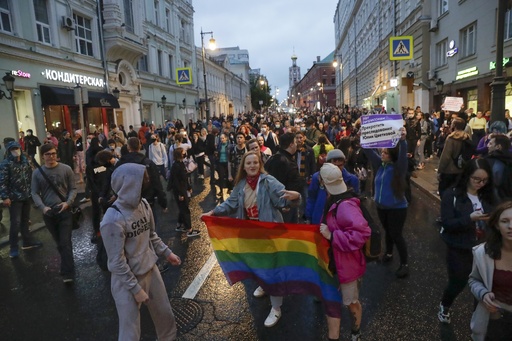
TALLINN, Estonia — In recent times, human rights organizations, advocates, and independent media outlets operating in Russia and Belarus have encountered heightened governmental oversight, oppressive regulations, and in some cases, outright bans that force them to function from overseas. Despite these obstacles, many have managed to persist.
Currently, these entities are grappling with an additional hurdle following the announcement by U.S. President Donald Trump to halt all aid for a duration of 90 days. This assistance, which originated from the U.S. Agency for International Development (USAID) or its allied organizations, has been instrumental for several of these groups, providing essential grant funding.
“It’s undoubtedly a setback,” remarked an activist associated with Center-T, a notable Russian organization focused on LGBTQ+ rights, who requested anonymity for security concerns. They added that the absence of this funding will impede their potential for more impactful work. Descriptions of the aid freeze’s effects varied among rights groups and independent media, with reactions ranging from “bad” to “unpleasant.” While some organizations rely on alternative funding sources, such as private donations and grants from other entities, uncertainty looms regarding the ties of these funding partners to U.S. assistance.
The freeze is prompting various organizations to reduce costs and possibly forgo planned initiatives. Some Russian entities stated they would continue their operations, albeit with diminished resources, while others are facing more severe threats. The Russian rights group OVD-Info, which monitors political arrests and provides legal support, claims that its primary funding stems from widespread private donations, thus lessening the immediate impact of the aid freeze. However, Dmitry Anisimov, a spokesperson for OVD-Info, expressed concern that partners aiding their initiatives might be increasingly vulnerable. “The absence of those partners would substantially complicate our efforts, affecting those who seek help,” he explained.
An editor from an independent Russian news platform, currently functioning from exile, supported Anisimov’s views. While their budget suffered a small decline of under 10% due to frozen grants, the editor indicated that they are not in a position of imminent closure or layoffs. Center-T, whose main staff has relocated following the Russian Supreme Court’s classification of LGBTQ+ movements as extremist, experienced minimal loss of funding, which they attributed to not significantly depending on U.S. assistance.
Conversely, Kovcheg—a group providing shelter, legal assistance, and psychological support to Russians fleeing abroad—reported a 30% budget reduction due to the aid freeze. Founder Anastasia Burakova mentioned that while future projects and enhancements would be compromised, the group’s overall stability is still supported through crowdfunding and advertisements.
The tightening of regulations in Russia has made it increasingly prohibitive for independent groups to secure funding from local sources. Many rights organizations and media groups have been labeled as “foreign agents,” a classification that deters potential donors due to its negative implications. Furthermore, Russia’s advertising ban for these entities further complicates their financial situations, with some groups also being classified as “undesirable,” effectively criminalizing any association with them.
Amid the strain from the ongoing war in Ukraine, many organizations have relocated teams internationally to escape the growing repression. Burakova reflected on this, stating that increased repression has led groups to adapt by seeking more diversified funding rather than relying solely on one source. To counteract the impacts of the aid freeze, Russian philanthropist Boris Zimin and opposition figure Mikhail Khodorkovsky pledged $600,000 to assist affected groups, though Zimin acknowledged that this amount would hardly suffice. He emphasized the critical need to support media initiatives amidst these challenges.
In Belarus, the impact of the aid freeze is pronounced, with pro-democracy factions reporting that the halted U.S. aid—approximately $30 million—constitutes over half of their Western funding. This aid, which came from USAID and organizations like the National Endowment for Democracy, has left numerous NGOs and independent media organizations nearing closure. According to sources closely associated with Belarusian opposition leaders, recent assessments were sent to Western nations detailing the ramifications of the funding halt.
The absence of independent media and pro-democracy initiatives could lead to a resurgence of state-controlled propaganda in Belarus, enabling pro-Kremlin narratives to gain traction among the populace. An activist from the Belarusian Association of Journalists indicated that of the 30 significant media organizations operating from abroad, six have completely lost funding and are at risk of shutting down.
A report specified that $1.7 million in U.S. aid has been frozen, influencing the survival of independent media that had to relocate due to President Alexander Lukashenko’s crackdown on dissent in 2020. As a result, small newsrooms are making staff reductions to stave off closure, with one popular YouTube show announcing its imminent shutdown but seeking assistance through donations to continue operations briefly.
Activists anticipate that dozens of media projects will inevitably cease, while advocacy organizations are also feeling the pinch. A spokesperson close to the opposition revealed that upwards of 60-80 groups are facing the prospect of mass layoffs or permanent closures, forecasting a significant reduction in support for political prisoners and alternative educational programs for Belarusian youth.
Currently, over 1,200 political prisoners are incarcerated in Belarus, according to the leading human rights organization Viasna. The ongoing freeze in funding will “significantly impair” their operations, as noted by activist Pavel Sapelka; nonetheless, he remains hopeful that human rights advocates will find ways to continue their work. Franak Via?orka, a senior advisor to exiled leader Sviatlana Tsikhanouskaya, revealed that efforts to maintain independent media and civil society initiatives in Belarus are urgently underway despite the new challenges posed by the aid freeze.

